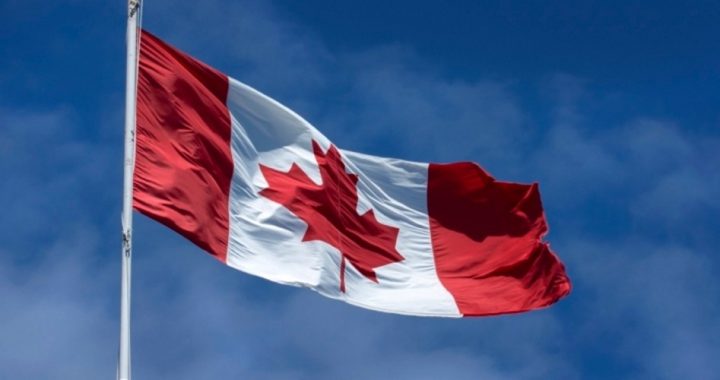
Former NSA contractor and whistleblower Edward Snowden, speaking from Russia via a Google Hangouts link, warned students at a prestigious private school in Toronto on February 4 that they should be “extraordinarily cautious” about Prime Minister Stephen Harper’s proposed new anti-terrorism bill.
“We saw on Friday the Prime Minister of Canada proposed a new law,” Snowden told more than 900 students attending Upper Canada College’s annual World Affairs Conference. “I would say we should always be extraordinarily cautious when we see governments trying to set up a new secret police within their own countries,” he added.
Harper unveiled the proposed legislation, the Anti-terrorism Act of 2015 (Bill C-51), during at speech in Richmond Hill, Ontario, on January 30. “Violent jihadism is not just a danger somewhere else,” the prime minister told his audience. “It seeks to harm us here in Canada — in our cities and in our neighborhoods, through horrific acts, like deliberately driving a car at a defenseless man or shooting a soldier in the back as he stands on guard at a War Memorial.”
Violent jihadism “is not a human right,” Harper stressed. “It is an act of war, and our government’s new legislation fully understands that difference.” He did not cite any specific examples of when and how “violent jihadism” has ever attacked Canada or Canadian interests.
Canadian Broadcasting Corporation (CBC) News reported on January 30 that the new bill would give the Canadian Security Intelligence Service (CSIS) “the authority to monitor, track, and even preemptively disrupt the activities of suspected terrorists and terrorist sympathizers.”
Additionally, reports CBC, the Anti-terrorism Act would also expand CSIS’s ability to take direct action to counter potential threats, from canceling plane reservations of those suspected of wanting to join the Islamic State of Iraq and Syria (ISIS) or other extremist groups overseas, to blocking financial transactions linked to suspected terrorist activity.
The new bill includes provisions that would make it a crime to “knowingly advocate or promote the commission of terrorist offences” and would give judges the power to seize “terrorist propaganda” or order it to be removed from online sites.
When a reporter asked Harper how he could guarantee that the measures authorized under the new bill wouldn’t conflict with “basic civil liberties,” the prime minister said there was “considerable oversight.” He then challenged the premise of the question.
“This is really what we get from our opposition,” said Harper. “Every time we talk about security, they suggest that somehow, our freedoms are threatened. I think Canadians understand that their freedom and their security more often than not go hand and hand. Canadians expect us to do both; we are doing both, and we do not buy the argument that every time you protect Canadians, you take away their liberties.”
Many Canadians disagree. The B.C. (British Columbia) Civil Liberties Association’s policy director, Micheal Vonn, stated the group’s opposition to the bill in a news release issued shortly after legislation was announced.
CBC quoted Vonn as saying,
This radical expansion of national security powers is not sound security policy and presents a real danger to Canadians. Criminalizing people’s words and thoughts is misguided and won’t make Canadians any safer. We will be less free, less democratic and less likely to know who to keep an eye on. This new law will impose a broad chill on legitimate political speech without enhancing public safety, and is likely unconstitutional.
The theme of this year’s World Affairs Conference, which Snowden and journalist Glenn Greenwald were invited to address, was “Privacy vs. Security: A Discussion of Personal Privacy in the Digital Age.”
Greenwald became widely known after the British newspaper The Guardian published his reports exposing the NSA’s surveillance programs based on the classified documents that Snowden had sent him using encrypted e-mail.
He posed this rhetorical question to the students at the conference:
Is it really possible for governments to do their jobs, in finding terrorist plots, or are they just collecting so much information on so many people — including people who have done nothing wrong — that they become incapable of finding what they say they’re looking for?
Snowden expressed the same concept when he said, “The problem with mass surveillance is when you collect everything, you understand nothing.”
In June 2013, the U.S. Justice Department charged Snowden with two counts of violating the Espionage Act, shortly after The Guardian published his disclosures and he made his identity known to the public. After seeking asylum from prosecution in several countries, he eventually was given permission to reside in Russia. He remains there while his efforts to have the charges against him dropped so he might return to the United States have been unsuccessful.
About this time last year, former Representative Ron Paul announced his sponsorship of a petition to allow Snowden to come home. A message posted on Paul’s website stated:
Edward Snowden shocked the world when he exposed the NSA’s illegal and abusive spying program. Instead of applauding him for his bravery and patriotism, the U.S. government labels Snowden a traitor.
In the video announcing the petition, Paul said:
On June 5, 2013, Edward Snowden sacrificed his livelihood, citizenship, and freedom by exposing the disturbing scope of the NSA’s worldwide spying program. Thanks to one man’s courageous actions, Americans know about the truly egregious ways their government is spying on them. By signing this petition, you are telling the US government that Mr. Snowden deserves the right to come home without the fear of persecution or imprisonment.
Snowden has been vilified as well as applauded for his actions. In an interview last May on MSNBC’s The Daily Rundown, Secretary of State John Kerry said, “Edward Snowden is a coward, he is a traitor, and he has betrayed his country. And if he wants to come home tomorrow to face the music, he can do so.”
Snowden is fully aware of the wide range of opinions that the world has of him and his actions to disclose the NSA’s covert spy program. However, he dismisses the disparate views as being irrelevant to the bigger question of whether the American public has a right to know what its government is doing.
Addressing the students at the conference, Snowden said that media coverage has focused too heavily on himself and not enough on the issues raised by the revelations of mass data collection. “When we talk about the mass media … they create narratives of heroes or traitors which distract from the issue at hand,” he explained, adding, “Whether or not I’m Mother Teresa or Adolf Hitler, that has no bearing whatsoever on the content of the reporting.”
Related articles:
Ron Paul Promotes Clemency Petition for Edward Snowden
NSA Matches Texted Images With Facial Recognition Software
Snowden’s Father, Lawyer, Challenge Obama’s Claims
Snowden Says NSA Targets Journalists Critical of Government
Report of Snowden Seeking Ties to KGB Vets False, Lawyer Says
Snowden Receives “Alternate Nobel” for Human Rights
Snowden Case: FBI Searches Home of Suspected “Second Leaker”
Snowden Reveals Secret NSA “MonsterMind” Program
Snowden: Encryption Needed to Protect Reporters, News Sources
NSA Claims Massive New Surveillance Powers, Snowden Docs Reveal
Kerry Says “Traitor” Snowden Should Come Home and “Face the Music”



